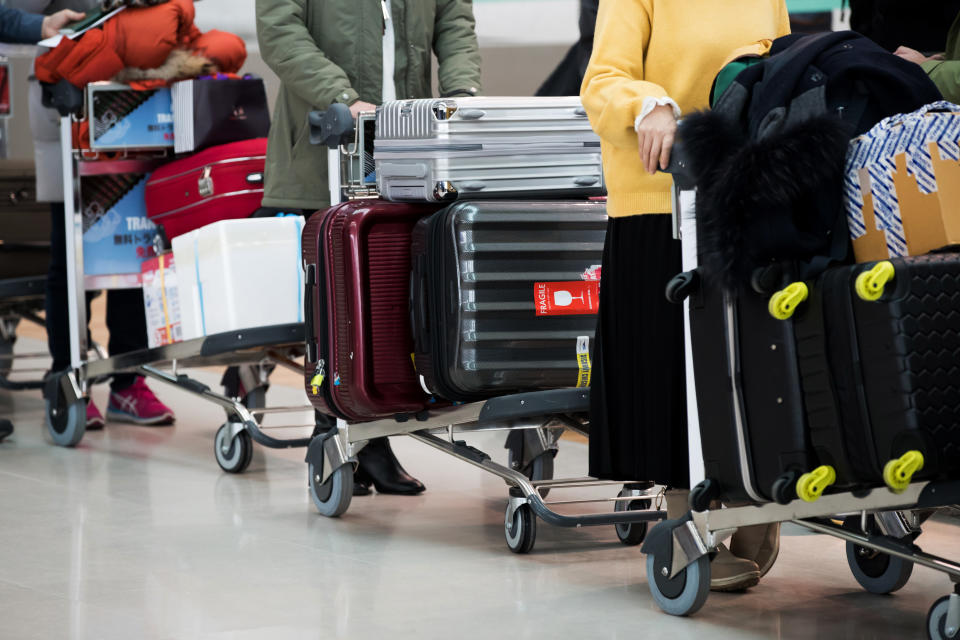Smart luggage has suddenly become a hassle

I have a Raden carry-on. It’s sleek, compact, and didn’t break the bank. There’s just one problem — I don’t plan to use it anytime soon.
The so-called smart luggage industry refers to bags with built-in lithium-ion batteries that allow you to conveniently charge your devices when there’s not an outlet in sight. And Jan. 15 marked a major turning point for the industry: The International Air Transport Association and American Airlines (AAL) implemented new guidelines that prohibit passengers from checking in bags with built-in batteries. Delta Air Lines (DAL) and Alaska Air Group (ALK) followed suit.
This shouldn’t be a big deal, given that fliers can remove the batteries when checking their bags, or leave them in place when carrying on. But anyone who has been on a domestic flight can attest that even the most compact of suitcases are often asked to be gate-checked because of a lack of room in the overhead bins.
Easier said than done
The original intention of upstarts like Away and Raden was to provide trendy carry-ons (priced between $195 to $300) in order to avoid the cost and nuisance of checking bags. However, as expected with any new airline policy, miscommunication and confusion has ensued this year.
Steph Korey, co-founder and CEO of Away, told Yahoo Finance that the company has been in “close contact with all of the major airlines and they have acknowledged that there have been a few hiccups around training and consistency in the roll out of their new battery policy.”
Korey confirmed that the policy is that passengers only need to remove the battery if they are checking in the bag.
And while acknowledging that it’s incredibly inconvenient to open a suitcase to remove a battery if you’re forced to gate check at the last minute, Korey said the company is working on a way to allow travelers to pop out the battery in the bag instead of having to open the suitcase to remove it — though it’s unclear when that option will exist.
Julia Kernan, who traveled to Utah from New York City for her honeymoon in December, said she has been nervous to fly with her Away luggage after an attendant told her that they would be completely banned on Jan. 15.
And while Away has been emailing its customers with detailed information on the new policy and trying to answer customer complaints on Twitter, potential misunderstandings could dampen the momentum the industry has been experiencing. In an interview with The Los Angeles Times, she said airline policies haven’t hurt sales.
Korey sent a memo to her staff last week citing the difficulties customers have been having trying to fly with their Away suitcases. “Over the past several weeks, we have heard from hundreds of customers regarding incidents where airline employees have made it clear they don’t understand their own airline’s policy, causing unnecessary problems for our (and their!) customers,” she wrote.
A Raden spokesperson said “cases were purposefully designed with a battery that can be easily removed in a matter of moments.”
Despite the described ease with which you can remove the battery, I can attest that the mere thought of having to remove the battery adds to the already stressful experience of air travel.
Smart luggage — minuscule but growing?
Whether plastered throughout New York City subway cars or peeped on celebrity-sponsored Instagram posts, these direct-to-consumer luggage brands have been garnering a lot of attention.
At least with companies like Raden and Away, the option to remove the battery still exists, even if it is cumbersome to do. Brands like Bluesmart have been immediately impacted, as their batteries are non-removable.
And, while these upstarts have been trying to disrupt the industry, the juggernauts still dominate the market. The smart luggage industry was worth around $630 million in 2016. Meanwhile, Euromonitor estimates that the luggage market is around $18.3 billion. Samsonite and LVMH are the top two brands in terms of marketshare of the bag and luggage category, comprising 13.8% and 4.5%, respectively. Samsonite-owned American Tourister, LVMH-owned Rimowa and Delsey round out the top five (which means Samsonite actually has 17.4% and LVMH has 6.8% of the market). Delsey has 1.9%.
While I appreciate and celebrate the novelty surrounding smart bags, it’s hard to imagine that these restrictions won’t impede their growth. Customer loyalty relies heavily on convenience. Let’s just hope that these seemingly innocuous bags won’t follow in the footsteps of the Samsung Galaxy Note 7 or hoverboards (when was the last time you saw one of those?).
Related Video:
Melody Hahm is a senior writer at Yahoo Finance, covering entrepreneurship, technology and real estate. Follow her on Twitter @melodyhahm.
Read more: